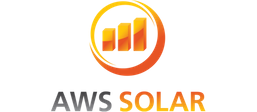Popular FAQs for AWS Solar
If you are considering solar panels or battery storage for your home or business in Los Angeles, California, you probably have a lot of questions. We’ve compiled some of the most popular FAQs to help you understand everything you need to know about going solar with AWS Solar.
General Solar FAQs
1. How do solar panels work?
Solar panels convert sunlight into electricity using photovoltaic cells. The electricity generated can be used to power your home or business, and any excess energy can be stored in a battery or sent back to the grid for credit.
2. How much can I save with solar panels?
Savings depend on your electricity usage, the size of your solar system, and the available sunlight in Los Angeles. Most customers see significant reductions in their energy bills, with some reducing their utility costs by up to 80%.
3. What is net metering, and how does it work?
Net metering allows you to send excess electricity produced by your solar panels back to the grid. In return, you receive credits that can offset your electricity costs when your panels aren’t producing enough power, such as at night.
4. Do I need to be home during the installation?
While it is not necessary for you to be present during the entire installation process, our team will communicate with you about any critical stages that require your presence. The installation typically takes a few days, depending on the system size.
5. What incentives are available for solar in California?
California offers various incentives, including the federal Investment Tax Credit (ITC), which allows you to deduct 30% of the cost of installing solar panels from your federal taxes. There are also state and local incentives available to further reduce installation costs.
Battery Storage FAQs
1. What are the benefits of adding battery storage to my solar system?
Battery storage allows you to store excess energy produced by your solar panels for use during the night or when utility rates are high. It also provides backup power during outages, keeping your home or business running smoothly.
2. How long do solar batteries last?
Most solar batteries are designed to last between 10 and 15 years, depending on usage and maintenance. AWS Solar uses high-quality batteries to ensure long-term reliability and performance.
3. Can I add a battery to my existing solar system?
Yes, adding a battery to an existing solar system is a great way to maximize your energy savings and increase your independence from the grid. Our team can evaluate your current setup and recommend the best battery solution for your needs.
4. How much backup power does a battery provide?
The amount of backup power depends on the size of your battery and your energy usage. A typical home battery can provide backup for essential appliances, such as lights, refrigeration, and internet, for several hours or even days, depending on usage.
Solar Installation and Maintenance FAQs
1. How long does it take to install a solar energy system?
The installation process typically takes 1 to 3 days, depending on the size of the system and site conditions. Permitting and approvals may add a few weeks to the overall timeline.
2. What kind of maintenance do solar panels require?
Solar panels require minimal maintenance. Keeping them clean and free of debris will help maximize their efficiency. AWS Solar provides maintenance services to ensure your system continues to perform optimally.
3. Will solar panels work on cloudy or rainy days?
Yes, solar panels can still generate electricity on cloudy or rainy days, though their efficiency may be reduced. Batteries can help store excess energy produced during sunny days to cover usage during cloudy periods.
Costs and Financing FAQs
1. How much does a solar panel system cost?
The cost of a solar system varies based on the size, location, and components used. AWS Solar offers customized quotes to meet your energy needs and budget, along with financing options to make going solar affordable.
2. What financing options are available?
We offer several financing options, including no-money-down leases, power purchase agreements (PPAs), and low-interest loans. Our team will work with you to determine the best financing solution for your needs.
3. Are there tax benefits for installing solar panels?
Yes, there are significant tax benefits, such as the federal Investment Tax Credit (ITC), which covers 30% of your installation costs. California also offers additional rebates and incentives to make solar energy even more affordable.
Getting Started with AWS Solar
1. How do I get started with AWS Solar?
Getting started is easy! Simply contact us for a free consultation. Our team will assess your energy needs, design a customized solar solution, and walk you through the installation process.
2. Does AWS Solar provide service for systems installed by other companies?
At this time, we only provide repair and maintenance services for systems installed by AWS Solar. However, we do offer solar panel removal and reinstallation for roof repairs, ensuring your solar investment is well protected.
Contact Us Today
Have more questions? Contact AWS Solar today, and our friendly team will be happy to assist you. Let us help you make the transition to clean, renewable energy and take control of your electricity costs.
